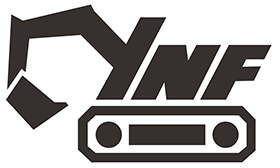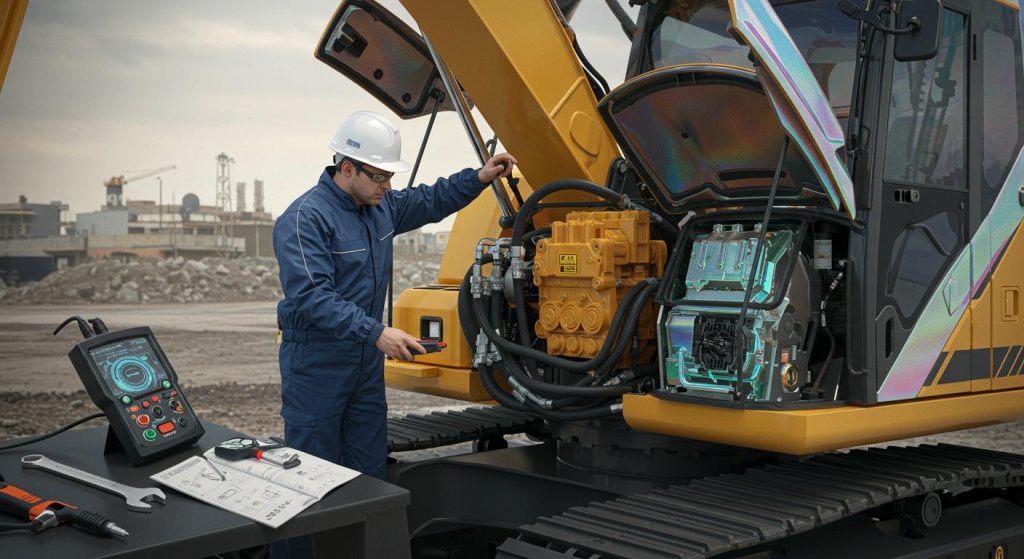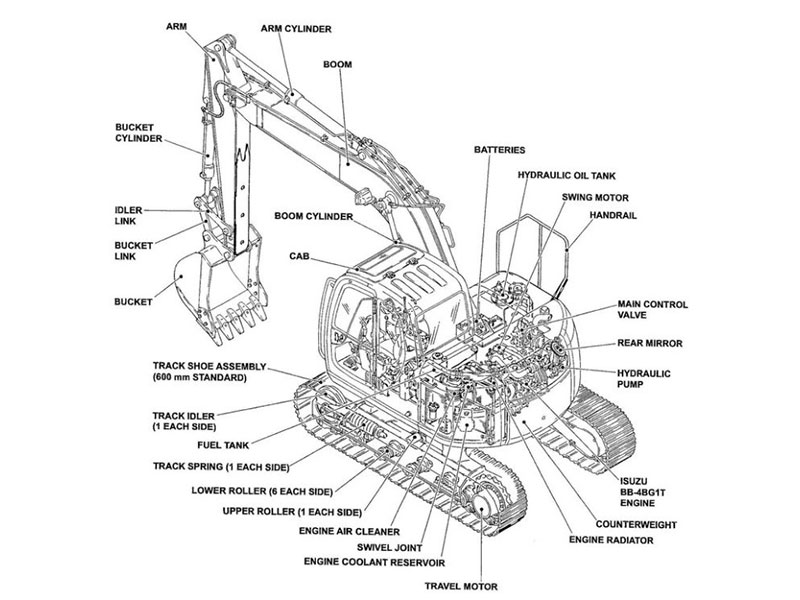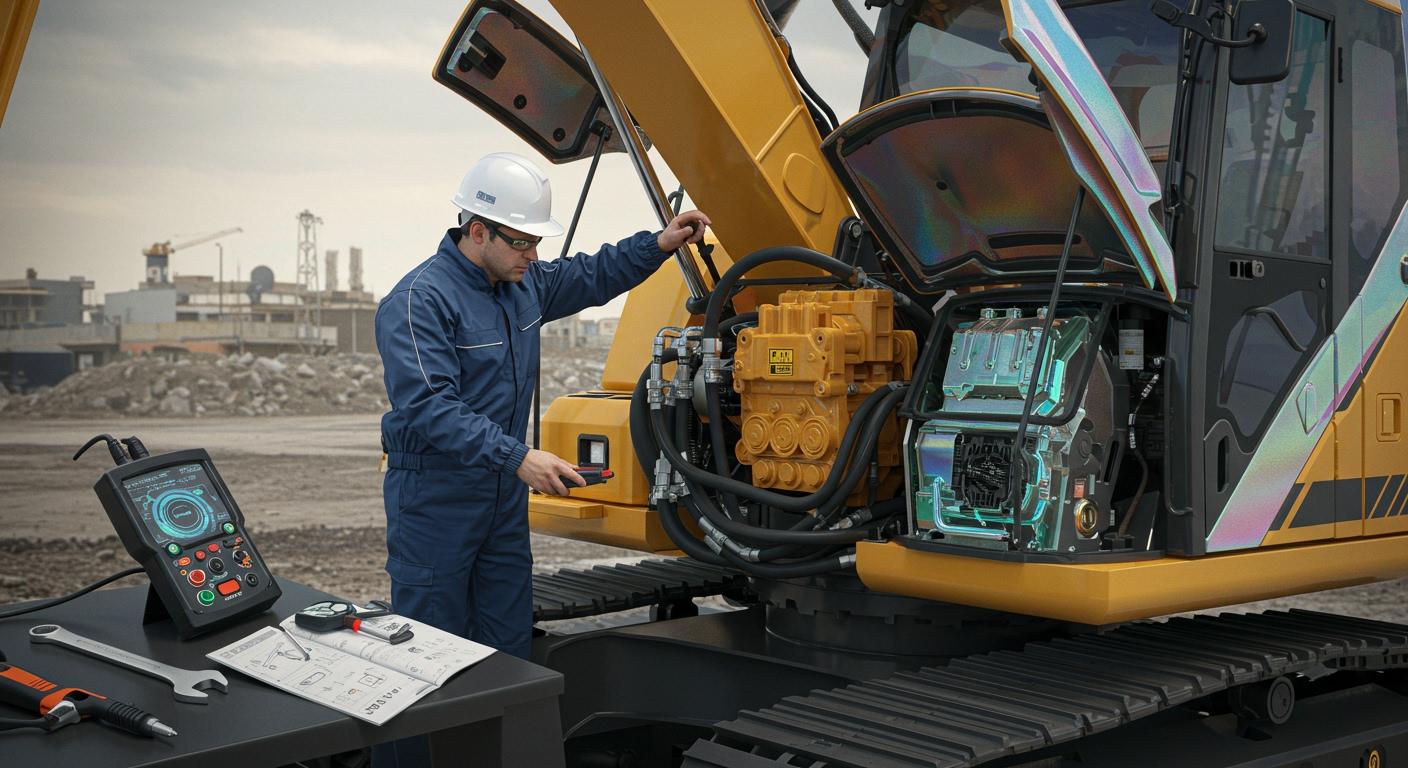
You must find hydraulic pump problems in your excavator fast. If you hear banging or knocking, pay attention. If cycles are slower, or fluid gets hotter than 180°F, your machine may have big problems. These signs often mean trouble in the hydraulic system. The table below lists the most common signs operators see:
Symptoms | Description |
|---|---|
Abnormal Noise | Banging or knocking from air bubbles or cavitation in the hydraulic system. |
Slow Operation | Longer cycle times and slow machine movement. |
High Fluid Temperature | Fluid hotter than 180°F, which can hurt seals and damage hydraulic fluid. |
Knowing how an excavator hydraulic pump works is crucial to help you act fast. Understanding how does an excavator hydraulic pump work enables you to keep your machine functioning well. You will get easy steps and tips to fix these problems.
Key Takeaways
Listen for odd noises like banging or grinding. These sounds can mean there is air in the system or not enough fluid.
Check the fluid temperature often. If it goes over 180°F, it can hurt seals and make the pump work less well.
Look for leaks a lot. Oil spots on the ground can show leaks. Leaks can lower pressure and make the pump get too hot.
Keep the hydraulic fluid clean. Dirty oil can cause a lot of damage to pump parts.
Check fluid levels every day and listen for weird sounds. Finding problems early can stop expensive repairs.
How Does an Excavator Hydraulic Pump Work
Basic Operation
It is important to know how an excavator hydraulic pump works. The pump takes power from the engine and turns it into hydraulic energy. This makes fluid move and builds pressure in the system. When you use the excavator, the engine spins the transmission shaft. The shaft moves a rod that pushes the piston inside the cylinder. The cam and spring help the piston go up and down. This action moves oil and creates a vacuum in the pump chamber.
Tip: If you hear odd sounds or see slow movement, look at the pump for signs of pump cavitation. Cavitation can happen when there are air bubbles in the fluid or not enough oil.
Here is how an excavator hydraulic pump works when everything is normal:
The engine starts the hydraulic pump, and fluid begins to flow.
Pressure grows as fluid moves and meets resistance, like lifting something heavy.
The main control valve sends fluid under pressure to different cylinders:
Boom up: Fluid goes to the bottom of the boom cylinder.
Bucket curl: Fluid moves to the bucket cylinder.
Track movement: Fluid powers the drive motors.
The pump increases force by using cylinder size. The same pressure can do different jobs.
Used fluid goes back to the tank through filters. The relief valve keeps the pressure safe.
Fluid moving around cools the system. Too much heat can ruin fluid and hurt parts.
Key Components
You need to know the main parts to understand how an excavator hydraulic pump works. Each part has a special job in the system.
Component | Function |
|---|---|
Hydraulic Pump | Moves hydraulic fluid from the oil tank to the hydraulic system. |
Gear Pump | Uses gears that fit together to pull hydraulic fluid. |
Piston Pump | Uses pistons that move back and forth for more hydraulic power. |
Vane Pump | Has a rotor with vanes to make vacuum and pressure, good for different speeds. |
Gear pumps use gears to move fluid. Many excavators have them.
Piston pumps give strong output and good control. Pistons move back and forth inside.
Vane pumps work well at many speeds. They use a rotor with vanes to make pressure.
When you know how an excavator hydraulic pump works, you can find problems early and keep your machine working well.
Common Hydraulic Pump Problems
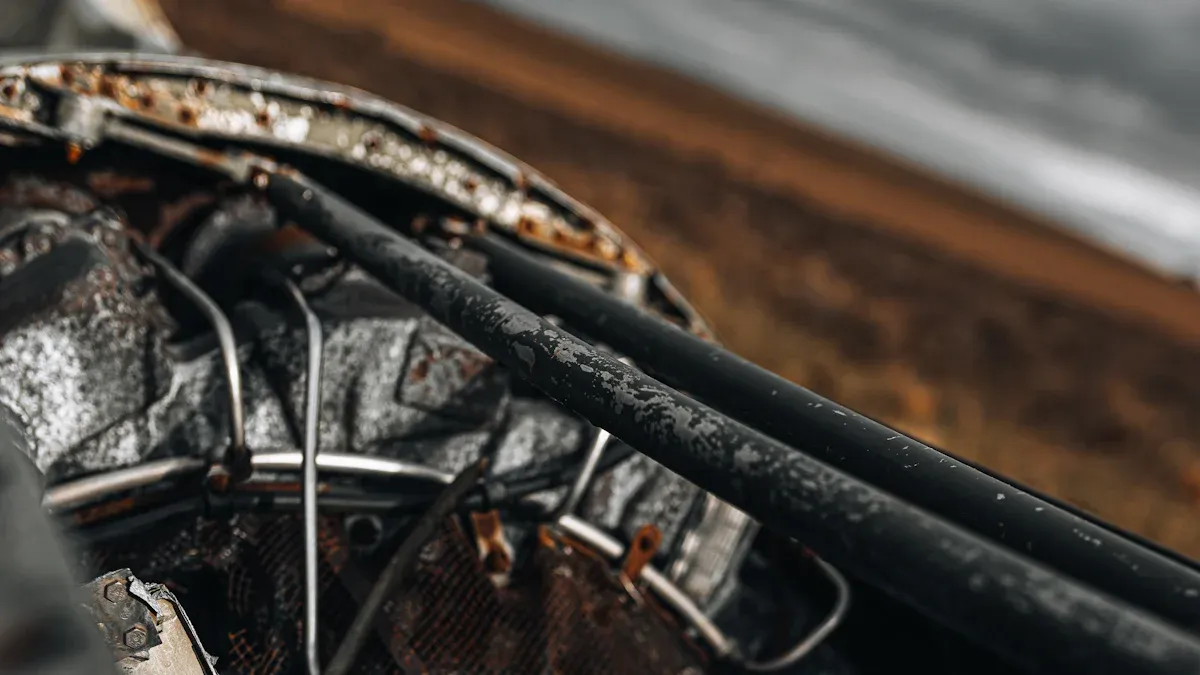
You may see many hydraulic pump problems with excavators. Knowing what to look for helps you fix issues fast. Here are the main problems you should know about:
Unusual Noises
If you hear grinding or banging, there may be air in the system. These sounds can mean air bubbles or not enough fluid. Check for leaks and make sure oil is filled. Strange noises can also mean parts inside the pump are worn out.
Overheating
Overheating happens a lot with hydraulic pumps. When fluid gets too hot, it gets thin and cannot protect parts. High heat can break seals and cause leaks. Overheating makes work unsafe and wears out parts faster.
Hydraulic Pump Problem | Description |
|---|---|
Overheating | Makes fluid thin, hurts parts inside, and is unsafe. |
Air in Pump/Fluid | Too much air makes the pump work badly and jumpy. |
Low Oil/Incorrect Oil | Can make the pump overheat and move unevenly. |
Loss of Pressure
Loss of pressure means your excavator cannot lift or move well. You may see less speed or power. Worn parts, pump damage, or leaks can cause this. If pressure drops, look for leaks and check seals.
Erratic Movement
Jumpy movement is another pump problem. Parts may move in a rough way. Air bubbles, dirty fluid, or low oil can cause this. Check for leaks and make sure fluid is clean.
Reduced Power
Reduced power makes your excavator slow and weak. This can happen from pump damage, cavitation, control problems, or dirty fluid. If you see slow speed or more fuel use, check the pump and fluid.
Cause of Power Loss | Explanation |
|---|---|
Pump degradation | Worn parts leak and lower pressure and flow. |
Pump cavitation | Not enough fluid causes noise, shaking, and damage. |
Contaminated hydraulic fluid | Dirty fluid wears parts out and causes leaks. |
Fluid Leaks
Fluid leaks are easy to see. You may spot oil on the ground or dripping from hoses. Leaks lower fluid, cause overheating, and drop pressure. Always look for leaks when you check your machine.
Contamination
Contamination is a big cause of pump problems. Dirt, metal, water, and air can get inside. These things scratch parts, cause rust, and make air bubbles. Studies show contamination causes most hydraulic failures. Oil with dirt can make pumps work worse by 18%. Test dust can lower efficiency by 76%. Keeping fluid clean helps stop pump problems.
Tip: Always look for leaks and dirt when you do maintenance. Clean fluid and tight seals help your excavator work well.
Troubleshooting Hydraulic Pumps
When you face problems with your excavator, you need a clear plan for troubleshooting hydraulic pumps. This section gives you step-by-step actions for each common issue. You will learn how to use checks and inspections to find the cause and fix it fast.
Diagnosing Noises
Strange noises from your hydraulic pump often mean trouble. You might hear banging, knocking, or grinding. These sounds can come from air in the oil, low oil levels, or worn parts.
Steps to diagnose noises:
Listen for any unusual sounds when you start the machine.
Check the oil level in the tank. Low oil can let air into the system.
Inspect the oil for bubbles or foam. Air in the oil causes cavitation and noise.
Look at the pump and hoses for leaks. Leaks let air in and oil out.
Replace worn or damaged parts if you find them.
Tip: Always use the right oil type and keep it at the correct level. This helps prevent air from entering the system.
Checking for Overheating
Overheating can damage your hydraulic pump and oil. Hot oil loses its ability to protect parts and can break seals.
How to check for overheating:
Feel the hydraulic tank and lines. If they are too hot to touch, the oil may be overheating.
Use a temperature gun to measure the oil temperature. Oil should stay below 180°F.
Check for blocked coolers or dirty filters. These can stop oil from cooling.
Make sure the oil is clean. Contaminated fluid heats up faster.
Look for signs of thin or burnt oil. Dark color or a burnt smell means the oil is too hot.
Note: Overheating often comes from low oil, dirty oil, or blocked coolers. Regular checks help you catch these problems early.
Pressure Relief Valve Inspection
The pressure relief valve keeps your system safe by controlling oil pressure. If it fails, you can have low power or dangerous overpressure.
What to look for during inspection:
The system cannot reach the right pressure. This may mean the valve is damaged or set wrong.
The system goes over the safe pressure limit, but the valve does not open. Contaminants or misalignment can cause this.
The valve leaks oil. Leaks lower efficiency and need a close look.
The valve releases pressure too soon or makes a chattering sound. This points to calibration or function problems.
Checklist for relief valve inspection:
Check for oil leaks around the valve.
Listen for chattering or hissing sounds.
Test the system pressure to see if the valve opens at the right setting.
Clean or replace the valve if you find problems.
Using a Pressure Gauge
A pressure gauge helps you check if your hydraulic pump works within the right range. This tool is key for troubleshooting hydraulic pumps.
Steps to use a pressure gauge:
Attach the gauge to the test port on the hydraulic system.
Start the engine and let the oil warm up.
Watch the gauge as you operate the controls.
Compare the reading to the machine’s specs.
If the pressure is too low or too high, look for leaks, blockages, or valve problems.
Tip: Always remove the gauge after testing and check for oil leaks at the connection point.
Identifying Leaks
Leaks waste oil and lower system pressure. You need to find and fix leaks fast to keep your excavator running well.
How to identify leaks:
Look for oil spots under the machine or on the ground.
Check hoses, fittings, and seals for wet spots or drips.
Inspect the pump and cylinders for oil buildup.
Pay attention to oil levels. If you add oil often, you may have a hidden leak.
Leaks often come from:
Poor design that creates weak spots.
Worn seals that let oil bypass the piston.
Mistakes during assembly or maintenance that damage seals.
Note: Regular maintenance and careful checks help prevent leaks. Replace worn seals and tighten fittings as needed.
Detecting Contamination
Contaminated fluid can ruin your hydraulic pump. You need to check the oil for dirt, water, and other harmful things.
Common contaminants and how to spot them:
Water: Oil looks milky or cloudy. You can also sample oil from the bottom of the tank.
Sludge, gum, or varnish: Oil changes color, smells bad, or feels sticky.
Hard particles: You may see grit or metal in the oil. Fluid analysis can confirm this.
Air: Bubbles in the oil or jumpy machine movement.
Steps to check for contamination:
Park the excavator on level ground and lower all attachments.
Turn off the engine and let it cool for at least 30 minutes.
Use the sight glass or dipstick to check oil clarity and color.
If you see signs of contaminated fluid, change the oil and filter right away.
Tip: Clean oil and regular checks keep your hydraulic system healthy. Always use the right oil and change it on schedule.
Summary Table: Troubleshooting Steps
Problem | What to Check | How to Fix |
|---|---|---|
Noises | Oil level, air in oil, worn parts | Add oil, bleed air, replace parts |
Overheating | Oil temp, cooler, oil quality | Clean cooler, change oil, check filters |
Low Pressure | Relief valve, leaks, oil level | Adjust valve, fix leaks, add oil |
Leaks | Seals, hoses, fittings | Replace seals, tighten fittings |
Contamination | Oil color, particles, water | Change oil, replace filter |
Regular checks and fast fixes help you avoid big repairs. Make maintenance a habit to keep your excavator strong.
Essential Maintenance
Taking care of your excavator’s hydraulic pump means doing regular checks. These checks help stop breakdowns, overheating, and seal problems. You should watch flow rates, pressures, and noise every day. These steps help you avoid pump failures and keep your machine safe.
Daily Checks
You need to do daily checks before you start work. These steps help you find problems early and protect your pump.
Check fluid levels. Low oil can hurt the pump.
Look for leaks. Wet spots around connections can get worse.
Check hoses and fittings. Cracks mean you should replace them.
Clean near the reservoir cap. Dirt can get in when you add oil.
Listen for strange sounds. Whining or grinding may mean pump trouble.
Check pipes, fittings, and couplers for dents or rust.
Check the system temperature. Overheating can mean cooler or valve issues.
Look inside the reservoir. Air bubbles can cause overheating and seal wear.
Listen to the pumps. High whining can mean cavitation.
Tip: Make daily checks a habit. You will find problems before they get bad.
Weekly Inspections
Weekly checks help you spot wear and keep your pump working longer. You should look for dirt and clean parts that get dirty.
Check if the hydraulic fluid is clean. Dirty oil causes most pump problems.
Clean filters and grease moving parts. This stops dirt from hurting the pump.
Look for dirt around seals and gaskets. Dirt here can cause leaks.
Check pump parts for wear. Replace damaged parts.
Note: Weekly checks help you avoid expensive repairs. Clean oil and filters keep your pump strong.
Monthly Tasks
Monthly tasks are for deeper checks. You need to look at the whole system and find hidden problems.
Test flow rates and pressures with a gauge. Good flow and pressure mean the system works well.
Check seals and gaskets for damage. Replace them if you see cracks or leaks.
Look at maintenance records. Track oil changes and repairs to find patterns.
Test oil samples. Look for dirt or breakdown.
Clean the reservoir and change filters if needed.
Callout: Monthly tasks help you find problems that daily and weekly checks miss.
Hydraulic Fluid Care
Taking care of hydraulic fluid is very important. You need to use the right oil and change it on time.
Maintenance Aspect | Description |
|---|---|
Correct viscosity | Lubricates parts and keeps oil thick enough at different temperatures. |
Density of hydraulic fluid | Affects pressure and flow rate. Thick oils help stop dirt. |
Anti-wear performance | Additives protect metal parts and lower friction. |
Thermal stability | Oil must handle heat without breaking down or making deposits. |
Indicators of oil deterioration | Check oil’s look, feel, and test for dirt. These show oil condition. |
You should change hydraulic oil after about 600 hours of use. This is extra important if you use a hydraulic breaker. Start a routine to test oil and decide when to change it. Changing oil often helps remove dirt and keeps the system clean.
Tip: Always use good oil. Bad oil or low levels can cause overheating and wear out your pump faster.
Watching flow rates and pressures helps keep your pump working well. Good flow and pressure mean your system is safe. You can make your machine last longer and safer by knowing how flow works. Check seals and gaskets often to stop leaks and keep performance high. Dirty oil wears out parts and shortens pump life.
Doing daily checks, weekly inspections, and monthly tasks helps you stop pump failures. You keep your excavator strong and ready for work.
Reliability Tips
Quality Parts
You can make your excavator work better by using good parts. These parts are tested in tough ways before you buy them. Good parts help your hydraulic pump last up to 10,000 hours. Clean hydraulic fluid is also very important. If you keep your oil clean, your pump and other parts last longer. Studies show clean oil stops breakdowns and helps your excavator work more. YNF Machinery sells tested hydraulic pump parts and offers ways to help with maintenance. You can trust their products to help your excavator work well and save money on repairs.
Tip: Always use clean oil and trusted parts to keep your hydraulic pump safe.
Operator Training
Operator skills are important for keeping the hydraulic pump working. Training your team helps lower the chance of pump problems. Here are some facts about operator training:
Good operator habits can make the hydraulic system last 30-40% longer.
Training can lower hydraulic failures by 25-35%.
Spending $2,500-$5,000 on training for each operator can give you 10-15 times more value by having fewer breakdowns and better work.
You should teach operators to check oil levels, look for leaks, and listen for strange sounds. Good habits help keep the pump safe and the oil clean.
Maintenance Records
Keeping good records helps you find problems before they get worse. You can write down oil changes, repairs, and checks. This makes it easier to see patterns and plan for future work. The table below shows how records help you:
Aspect | Impact on Hydraulic Pump Failures |
|---|---|
Maintenance History | Shows what work was done, finds problems that happen again, and helps plan future checks. |
Predictive Maintenance | Finds patterns in how things work to guess problems and plan fixes. |
Documentation and Records | Makes your excavator worth more and helps you find problems early. |
If you skip checks or forget to clean parts, you can get blockages and wear. Dirty oil can cause rust and hurt your pump. You should always write down every oil change and inspection to keep your excavator working its best.
Checking your excavator hydraulic pump often helps it work well. You can stop big problems if you fix issues early.
Looking at your pump a lot helps you find leaks and dirt fast.
Learning how to use the pump helps you hear odd sounds and see pressure changes.
Doing regular checks and writing down what you do helps your pump last longer.
If you check your pump before problems start, your excavator will work better and last longer.
FAQ
What causes hydraulic pump noise in excavators?
Air in the oil, low fluid levels, or worn pump parts often cause noise. You should check for leaks and make sure you use the right oil. Listen for banging or grinding sounds during operation.
How often should you change hydraulic fluid?
You should change hydraulic fluid every 600 hours of use. If you use a hydraulic breaker, change it more often. Clean oil helps your pump last longer and work better.
What should you do if you find a leak?
Find the source of the leak. Tighten fittings and replace damaged seals or hoses. Clean the area and check fluid levels. Leaks can lower pressure and damage your pump.
Can dirty oil damage your hydraulic pump?
Yes. Dirty oil can scratch pump parts and cause rust. You should always use clean oil and change filters on schedule. Clean oil keeps your pump strong and safe.
Where can you buy quality hydraulic pump parts?
You can buy tested hydraulic pump parts from YNF Machinery. They offer reliable products and support for excavator maintenance. Quality parts help your pump work longer and avoid breakdowns.
